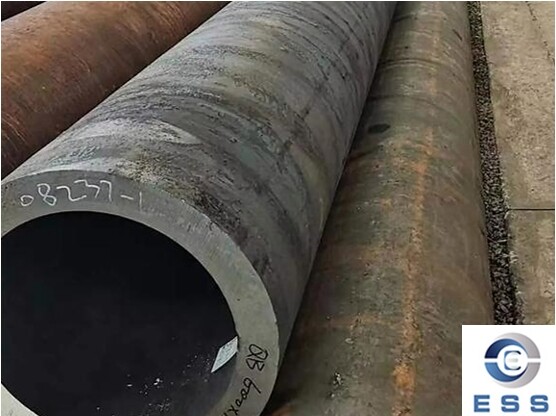
Cold drawn seamless hydraulic tubes are the key components used
in high-pressure hydraulic systems in the industrial field. It is widely used
due to its high strength, pressure resistance and precision dimensions. Cold
drawn seamless hydraulic tube refers to a seamless steel pipe made by cold
drawing process. It has high-precision dimensions, smooth inner wall and high
strength. It is suitable for high-pressure hydraulic systems (such as
engineering machinery, injection molding machines) and fluid transmission.
Cold Drawn Seamless Hydraulic Tube: Process Manufacture
The manufacturing process of
cold drawn seamless hydraulic tube combines cold deformation technology and
precision machining. The core steps are as follows:
1. Raw material preparation
Hot-rolled seamless steel
tube is selected as the initial billet (such as 20#, 45# steel). It is
necessary to ensure that the surface is free of cracks and the oxide scale is
uniform. Cut the long tube billet into a length suitable for cold drawing (usually
3-6 meters).
2. Pretreatment process
Use hydrochloric acid or
sulfuric acid solution to remove the iron oxide scale on the surface of the
tube billet to improve the subsequent lubrication effect. Form a phosphate
coating (such as phosphating film) on the surface of the tube billet to reduce
friction during cold drawing and prevent strain.
3. Cold drawing
The tube billet is passed
through the carbide die (or diamond die) on the cold drawing machine, and axial
tension is applied at room temperature to reduce the outer diameter and wall
thickness of the tube and extend the length. High-precision tubes need to be
drawn multiple times, and the deformation amount is controlled at 10%-30% each
time to avoid cracking. During the drawing process, the metal grains are
refined, the strength is significantly improved, but the plasticity decreases.
4. Heat treatment
Eliminate the internal
stress caused by cold drawing and restore the toughness of the material (such
as 45# steel needs 500-650℃ annealing). Alloy steel pipes (such as 30CrMo) are quenched + high-temperature
tempered to balance strength and toughness.
5. Finishing and testing
The bends caused by cold
drawing are eliminated by roller straightening machine. Cut into standard
lengths (such as 6 meters or customized sizes) as required. Ultrasonic flaw
detection (UT) or eddy current testing (ET) to check internal cracks and inclusions.
Finally, polish, apply anti-rust oil or coating (such as galvanizing).
Cold Drawn Seamless Hydraulic Tube: Common Materials
The material selection of
cold-drawn seamless hydraulic tubes directly affects the performance. Common
materials are as follows:
1. Carbon steel
Common models are 20# and
45#. The characteristics of carbon steel are low cost, moderate strength, and
easy processing; poor corrosion resistance, surface treatment is required, and
it is more suitable for ordinary hydraulic systems and agricultural machinery
equipment.
2. Low alloy steel
Common models are 27SiMn and
30CrMo. The characteristics of low alloy steel are high strength (tensile
strength ≥800MPa),
high temperature resistance (≤400℃), good fatigue resistance, and suitable for engineering machinery
and heavy-duty hydraulic cylinders.
3. Stainless steel
Common models are 304 and
316L. The characteristics of stainless steel are strong corrosion resistance
and beautiful appearance; high cost, difficult cold processing (easy to
harden), suitable for chemical, marine, and food-grade hydraulic systems.
4. High-strength special
steel
Common models are ST52 and
E355. High-strength special steel generally meets European standards, has high
pressure bearing capacity, and excellent welding performance. Most of them are
used in shipbuilding and aerospace hydraulic pipelines.
Advantages of Cold Drawn Seamless Hydraulic Tubes
1. High strength and
pressure resistance
Cold working hardening
increases the tensile strength by 20%-50% (for example, the strength of 45#
steel after cold drawing can reach more than 600MPa). The seamless structure
has no weld weak points and the pressure bearing capacity is better than welded pipes.
2. High dimensional accuracy
and surface quality
The outer diameter tolerance
can reach ±0.1mm, and
the inner wall roughness Ra≤0.8μm, which reduces the energy loss of the hydraulic system. Suitable
for precision hydraulic cylinders and servo control systems.
3. Lightweight design
Thin-walled tubes (such as
wall thickness 1.5mm) can achieve lighter weight under the same pressure, which
is suitable for mobile equipment (such as forklifts and excavators).
4. High material utilization
rate
The cold drawing process has
almost no cutting waste, which is environmentally friendly and
cost-controllable.
Disadvantages of Cold Drawn Seamless Hydraulic Tubes
1. High process complexity
Multiple drawing + heat
treatment is required, and the production cycle is long (such as 5-7 days to
produce a batch of precision tube). Large mold loss (carbide
mold life is about 5000-10000 times).
2. Decreased material
plasticity
After cold processing, the
material ductility decreases, and subsequent bending or flaring processing is
prone to cracking, requiring annealing to restore plasticity.
3. Wall thickness uniformity
challenge
Ultra-thin wall tubes (wall
thickness <2mm) are prone to eccentricity or ovality problems, requiring
precision mold control.
Summary
Cold-drawn seamless
hydraulic tubes achieve high strength, high precision and light weight through
precision cold deformation process, and are ideal for high-pressure hydraulic
systems, but the complexity of the process and the challenge of wall thickness
uniformity need to be weighed. When selecting, the working pressure, medium
properties and budget should be considered, and if necessary, professional
suppliers should be consulted for customized design.













 Eastern Steel Manufacturing Co.,Ltd not only improve product production and sales services, but also provide additional value-added services. As long as you need, we can complete your specific needs together.
Eastern Steel Manufacturing Co.,Ltd not only improve product production and sales services, but also provide additional value-added services. As long as you need, we can complete your specific needs together.










